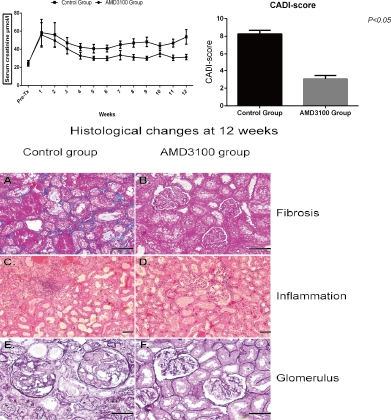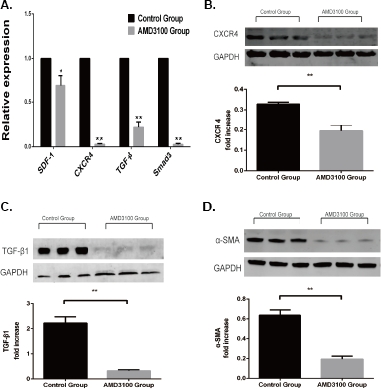Chemokine Receptor CXCR4 Antagonist, a Novel Pathway to Prevent Chronic Allograft Nephropathy.
Department of Urology, Beijing Chaoyang Hospital, Beijing, China.
Meeting: 2016 American Transplant Congress
Abstract number: D76
Keywords: Fibrosis, Graft survival, Kidney transplantation, Transforming growth factor-beta (TGF-b)
Session Information
Session Name: Poster Session D: Chimerism/Stem Cells, Cellular/Islet Transplantation, Innate Immunity, Chronic Rejection
Session Type: Poster Session
Date: Tuesday, June 14, 2016
Session Time: 6:00pm-7:00pm
 Presentation Time: 6:00pm-7:00pm
Presentation Time: 6:00pm-7:00pm
Location: Halls C&D
Background
Chronic allograft nephropathy (CAN) remains a major problem for long term graft survival and different pathways participate in its development. CXC chemokine receptor 4 (CXCR4) is significantly upregulated following renal injury and fibrotic response. We investigated the effect of AMD3100, a CXCR4 antagonist, on the development of CAN in rat models.
Methods
CAN rat models (n=20) were established using male Fisher 344 to Lewis rats. Rats in experimental group (n=10) were treated by AMD3100 (1mg/kg/day subcutaneously, 0-12 weeks), rats in control group (n=10) were treated by saline. The serum creatinine levels were monitored every week. Kidney grafts were harvested 12 weeks after modeling for histological analysis. We used chronic allograft damage index (CADI) scores to evaluate each group. Q-PCR and western blotting were used to measure SDF-1/CXCR4 axis, TGF-β1/Smad3 signaling pathway and α-smooth muscle actin (α-SMA) expression in renal allograft tissue.
Results
CXCR4 expression was increased significantly in control group which developed intense chronic changes after 12 weeks. Histological changes of CAN in experimental group were ameliorated by AMD3100 which also made better graft function compare to the control group.  AMD3100 significantly blunted the increase in the mRNA expression level of SDF-1/CXCR4 axis, TGF-β1 and Smad3. A significant reduction in TGF-β1 and α-SMA protein content was observed only in experimental group as shown in a representative western blot.
AMD3100 significantly blunted the increase in the mRNA expression level of SDF-1/CXCR4 axis, TGF-β1 and Smad3. A significant reduction in TGF-β1 and α-SMA protein content was observed only in experimental group as shown in a representative western blot. 
Conclusion
Based on these findings, CXCR4 expression may mediate in part the development of CAN. AMD3100 may ameliorate histological changes of CAN and maintain better allograft function. Its treatment blunts downstream effects of TGF-β1 signaling and fibroblast activation. Therefore, antagonism of CXCR4 may provide a novel way to prevent the development of CAN.
CITATION INFORMATION: Xu Y, Zhang Q, Hu X. Chemokine Receptor CXCR4 Antagonist, a Novel Pathway to Prevent Chronic Allograft Nephropathy. Am J Transplant. 2016;16 (suppl 3).
To cite this abstract in AMA style:
Xu Y, Zhang Q, Hu X. Chemokine Receptor CXCR4 Antagonist, a Novel Pathway to Prevent Chronic Allograft Nephropathy. [abstract]. Am J Transplant. 2016; 16 (suppl 3). https://atcmeetingabstracts.com/abstract/chemokine-receptor-cxcr4-antagonist-a-novel-pathway-to-prevent-chronic-allograft-nephropathy/. Accessed February 16, 2026.« Back to 2016 American Transplant Congress
